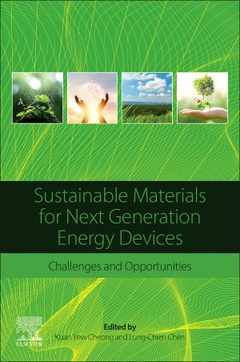Description
Sustainable Materials for Next Generation Energy Devices
Challenges and Opportunities
Coordinators: Cheong Kuan Yew, Chen Lung-Chien
Language: English
Subject for Sustainable Materials for Next Generation Energy Devices:
Keywords
energy conversion; energy storage; battery; supercapacitors; solar cell; perovskite
402 p. · 15x22.8 cm · Paperback
Description
/li>Contents
/li>Biography
/li>Comment
/li>
Part 1: Electrochemical systems and energy storage
1. Electrochemical energy storage devices
2. Nanoarchitectured conducting polymers: Rational design and relative activity for next-generation supercapacitors
3. Current progress in the development of Fe-air batteries and their prospects for next-generation batteries
4. Functional material developments of fuel cells and the key factors for real commercialization of next-generation energy devices
Part 2: Energy conversion and harvesting
5. Graphene and its derivatives, synthesis route, and mechanism for photovoltaic solar cell applications
6. Solution-processed quantum dot-sensitized solar cell based on “green materials
7. Colloidal quantum dots based solar cells
8. Future perspectives of perovskite solar cells: Metal oxide-based inorganic hole-transporting materials
9. Recent advancement in sustainable energy harvesting using piezoelectric materials
Part 3: Advanced sustainable energy, materials, and device concepts
10. An approach to designing smart future electronics using nature-driven biopiezoelectric/triboelectric nanogenerators
11. Polysaccharide-based polymer electrolytes for future renewable energy sources
12. Biomass-derived functional carbon nanomaterials for the development of futuristic energy devices
13. First-principles materials design for graphene-based sensor applications
14. Recycled silicon waste as a sustainable energy material
Kuan Yew Cheong has published approximate 200 high impact-factor journals, 6 reputable book chapters, 3 edited books, and 1 granted Malaysian Patent (MY-153033-A), which in-line with his research direction of solving environmental and energy related issue through the development of advanced oxide based on wide bandgap semiconductor and exploring the potential of utilizing natural organic materials to produce “all-natural electronic devices. As a registered Professional Engineer (Board of Engineers, Malaysia), a “Top Research Scientists Malaysia (TRSM) 2013 (Academy of Sciences Malaysia), and a Certified Professional Trainer (Ministry of Human Resource, Malaysia), Prof. Cheong has delivered more than 250 technical training courses to various local and multinational industries and has resolved many industrial cases related to
- Provides a concise resource for readers interested in sustainable and green functional materials for energy conversion and storage devices
- Emphasizes sustainable and green concepts in the design of energy devices based on renewable functional materials
- Presents a survey of both the challenges and opportunities available for renewable functional materials in the development of energy devices




